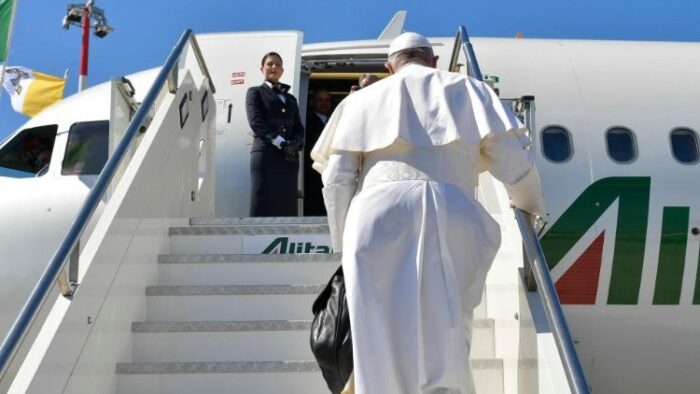
Pope Francis is set to fly to Canada on Sunday for his 37th Apostolic Visit abroad. He will be travelling to the Canadian cities of Edmonton, Quebec, and Iqaluit, where the Holy Father will bring his closeness to indigenous peoples who suffered from attempts to erase their culture, especially in the residential school system.
Newsroom (21/07/2022 10:45 PM Gaudium Press) On Wednesday, the Director of the Holy See Press Office, Matteo Bruni, presented the Pope’s 37th Apostolic Visit abroad during a briefing at the Press Office. The North American nation will be the 56th country he has visited. Pope Francis is following in the footsteps of his predecessor, St. John Paul II, who visited Canada three times during his pontificate, most recently in 2002. The Pope’s Journey comes in response to invitations he received from the Church and the civil authorities in Canada and Canada’s indigenous peoples themselves.
Bruni recalled how Pope Francis will visit the National Shrine of Ste. Anne de Beaupre in Quebec, where, like his predecessor, he will celebrate Mass.
At the Shrine, Pope Francis, again like John Paul II, will remember the first canonized Native American saint, Kateri Tekakwitha, and bless a statue of her.
The Director of the Holy See Press Office noted that St. Anne is essential for the indigenous, especially “out of respect for the elderly and the idea of the nonna (‘grandmother’).” St Anne and her husband St Joachim, the grandparents of Jesus, are patron saints of grandparents and the elderly.
In Iqaluit, Bruni warned, “it will be cold, very cold,” noting that only countries like Iceland and Norway have population centres further north. He joked that it could be refreshing for those suffering the intense heat during the scorching European heatwave.
The Trip protocol will be slightly different from others because the Holy Father will meet with authorities only once in Quebec, the second step of his travel, on Wednesday. Moreover, this time there will be representatives of the First Nations, Métis, and Inuit indigenous peoples at the encounter, which generally is reserved solely for civil authorities and diplomats.
A particularly significant moment of the trip will take place in the Arctic city of Iqaluit when Pope Francis will meet some former students of the infamous “residential schools” where indigenous children were often subjected to harsh discipline and sometimes mistreated and abused. It is now recognized that the residential school system sought to erase their culture.
Under that system, indigenous children were separated from their families, sometimes against their will, and forced to attend boarding schools away from their homes. Mortality rates were high in the institutions established and funded by the Canadian government, but whose management was entrusted to Christian communities, including Catholic dioceses and religious orders.
The Vatican spokesman recalled Pope Francis’ meeting in Rome with representatives of Canada’s First Nations, Métis, and Inuit communities this spring, when the Holy Father expressed “indignation and shame” for what their peoples experience.
On the Journey, the Pope will be joined by his usual papal entourage, which will include the Roman Curia’s two Canadian cardinals, the Prefect of the Dicastery for Bishops, Cardinal Marc Ouellet; and the Prefect of the Vatican’s Dicastery for Promoting Integral Human Development, Cardinal Michael Czerny.
At his events and Masses in Canada, the Pope is expected to deliver his nine discourses in Spanish. There will be jumbotrons in Edmonton and Quebec, which are expected to offer English and simultaneous French translations, respectively.
He suggested that the choice of Spanish is because Spanish is more widely understood than Italian and takes into account the experience of local translators. He also did not exclude that the choice of Spanish was made in view of reaching a wider audience, as there are many Spanish speakers in some parts of Canada.
(Via Vatican news)
compiled by Raju Hasmukh